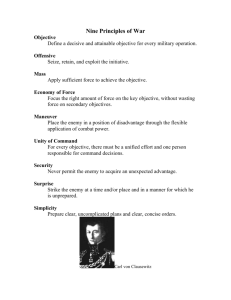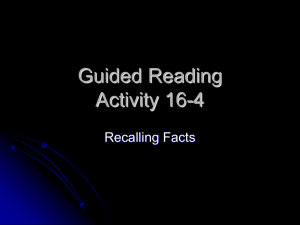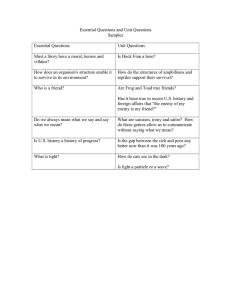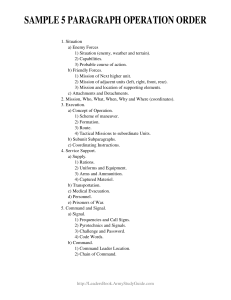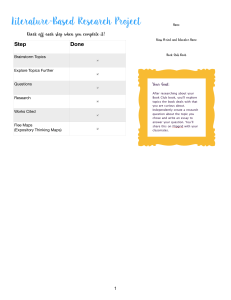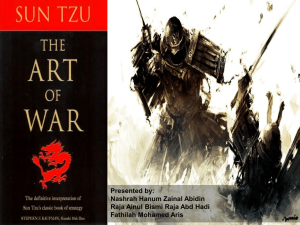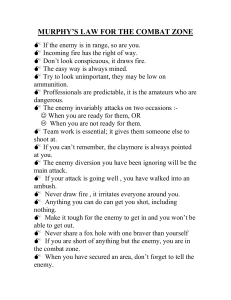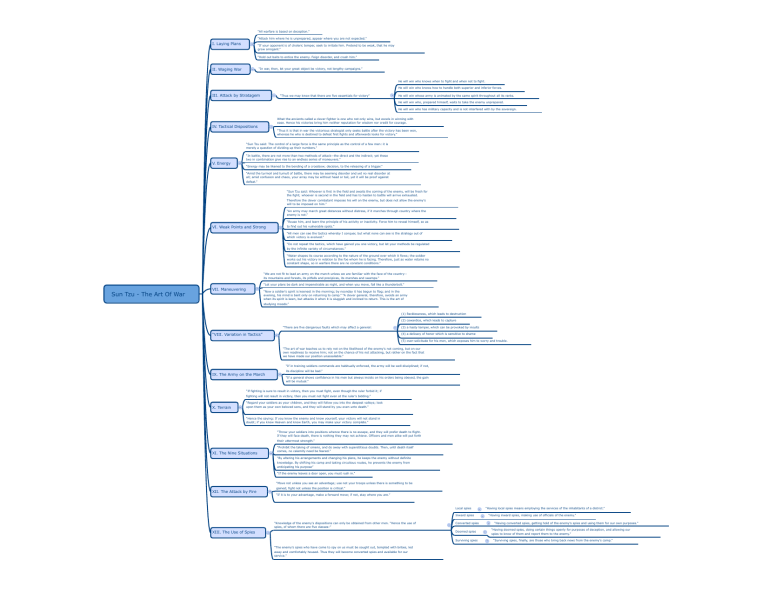
“All warfare is based on deception.”
“Attack him where he is unprepared, appear where you are not expected.”
I. Laying Plans
“If your opponent is of choleric temper, seek to irritate him. Pretend to be weak, that he may
grow arrogant.”
“Hold out baits to entice the enemy. Feign disorder, and crush him.”
II. Waging War
“In war, then, let your great object be victory, not lengthy campaigns.”
He will win who knows when to fight and when not to fight.
He will win who knows how to handle both superior and inferior forces.
III. Attack by Stratagem
“Thus we may know that there are five essentials for victory"
He will win whose army is animated by the same spirit throughout all its ranks.
He will win who, prepared himself, waits to take the enemy unprepared.
He will win who has military capacity and is not interfered with by the sovereign.
What the ancients called a clever fighter is one who not only wins, but excels in winning with
ease. Hence his victories bring him neither reputation for wisdom nor credit for courage.
IV. Tactical Dispositions
“Thus it is that in war the victorious strategist only seeks battle after the victory has been won,
whereas he who is destined to defeat first fights and afterwards looks for victory.”
“Sun Tzu said: The control of a large force is the same principle as the control of a few men: it is
merely a question of dividing up their numbers.”
V. Energy
“In battle, there are not more than two methods of attack—the direct and the indirect; yet these
two in combination give rise to an endless series of maneuvers.”
“Energy may be likened to the bending of a crossbow; decision, to the releasing of a trigger.”
“Amid the turmoil and tumult of battle, there may be seeming disorder and yet no real disorder at
all; amid confusion and chaos, your array may be without head or tail, yet it will be proof against
defeat.”
“Sun Tzu said: Whoever is first in the field and awaits the coming of the enemy, will be fresh for
the fight; whoever is second in the field and has to hasten to battle will arrive exhausted.
Therefore the clever combatant imposes his will on the enemy, but does not allow the enemy's
will to be imposed on him.”
“An army may march great distances without distress, if it marches through country where the
enemy is not.”
“Rouse him, and learn the principle of his activity or inactivity. Force him to reveal himself, so as
VI. Weak Points and Strong
to find out his vulnerable spots.”
“All men can see the tactics whereby I conquer, but what none can see is the strategy out of
which victory is evolved.”
“Do not repeat the tactics, which have gained you one victory, but let your methods be regulated
by the infinite variety of circumstances.”
“Water shapes its course according to the nature of the ground over which it flows; the soldier
works out his victory in relation to the foe whom he is facing. Therefore, just as water retains no
constant shape, so in warfare there are no constant conditions.”
“We are not fit to lead an army on the march unless we are familiar with the face of the country-its mountains and forests, its pitfalls and precipices, its marshes and swamps.”
“Let your plans be dark and impenetrable as night, and when you move, fall like a thunderbolt.”
Sun Tzu - The Art Of War
VII. Maneuvering
“Now a soldier's spirit is keenest in the morning; by noonday it has begun to flag; and in the
evening, his mind is bent only on returning to camp.” “A clever general, therefore, avoids an army
when its spirit is keen, but attacks it when it is sluggish and inclined to return. This is the art of
studying moods.”
(1) Recklessness, which leads to destruction
(2) cowardice, which leads to capture
“There are five dangerous faults which may affect a general:
“VIII. Variation in Tactics”
(3) a hasty temper, which can be provoked by insults
(4) a delicacy of honor which is sensitive to shame
(5) over-solicitude for his men, which exposes him to worry and trouble.
“The art of war teaches us to rely not on the likelihood of the enemy's not coming, but on our
own readiness to receive him; not on the chance of his not attacking, but rather on the fact that
we have made our position unassailable.”
“If in training soldiers commands are habitually enforced, the army will be well-disciplined; if not,
IX. The Army on the March
its discipline will be bad.”
“If a general shows confidence in his men but always insists on his orders being obeyed, the gain
will be mutual.”
“If fighting is sure to result in victory, then you must fight, even though the ruler forbid it; if
fighting will not result in victory, then you must not fight even at the ruler's bidding.”
X. Terrain
“Regard your soldiers as your children, and they will follow you into the deepest valleys; look
upon them as your own beloved sons, and they will stand by you even unto death.”
“Hence the saying: If you know the enemy and know yourself, your victory will not stand in
doubt; if you know Heaven and know Earth, you may make your victory complete.”
“Throw your soldiers into positions whence there is no escape, and they will prefer death to flight.
If they will face death, there is nothing they may not achieve. Officers and men alike will put forth
their uttermost strength.”
XI. The Nine Situations
“Prohibit the taking of omens, and do away with superstitious doubts. Then, until death itself
comes, no calamity need be feared."
“By altering his arrangements and changing his plans, he keeps the enemy without definite
knowledge. By shifting his camp and taking circuitous routes, he prevents the enemy from
anticipating his purpose”
“If the enemy leaves a door open, you must rush in.”
“Move not unless you see an advantage; use not your troops unless there is something to be
XII. The Attack by Fire
gained; fight not unless the position is critical.”
“If it is to your advantage, make a forward move; if not, stay where you are.”
Local spies
Inward spies
“Knowledge of the enemy's dispositions can only be obtained from other men. “Hence the use of
spies, of whom there are five classes:”
XIII. The Use of Spies
Converted spies
Doomed spies
Surviving spies
“The enemy's spies who have come to spy on us must be sought out, tempted with bribes, led
away and comfortably housed. Thus they will become converted spies and available for our
service.”
“Having local spies means employing the services of the inhabitants of a district.”
“Having inward spies, making use of officials of the enemy.”
“Having converted spies, getting hold of the enemy's spies and using them for our own purposes.”
“Having doomed spies, doing certain things openly for purposes of deception, and allowing our
spies to know of them and report them to the enemy.”
“Surviving spies, finally, are those who bring back news from the enemy's camp.”

